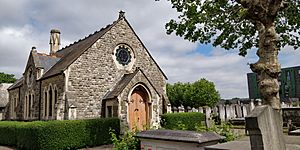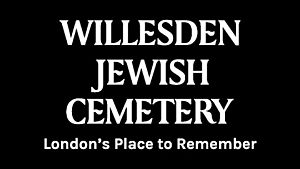Willesden Jewish Cemetery facts for kids

The cemetery's prayer hall, designed by Nathan Solomon Joseph
|
|
| Lua error in Module:Location_map at line 420: attempt to index field 'wikibase' (a nil value). | |
| Details | |
|---|---|
| Established | 1873 |
| Location |
Beaconsfield Road, Willesden (London Borough of Brent), London NW10 2JE
|
| Country | England, United Kingdom |
| Type | Orthodox Jewish |
| Style | Victorian; English Gothic |
| Owned by | United Synagogue Burial Society |
| Size | About 9.3 hectares |
| No. of graves | 29,800 |
|
Listed Building – Grade II
|
|
| Official name | Willesden Jewish Cemetery (United Synagogue Cemetery) |
| Designated | 4 September 2017 |
| Reference no. | 1449184 |
The Willesden United Synagogue Cemetery, often called Willesden Jewish Cemetery, is a special place for Jewish burials in Willesden, London. It first opened in 1873 and covers about 9.3 hectares (20 acres). Many people think it's one of the most important Jewish cemeteries in London. It's even listed as a Grade II historic park.
This cemetery has nearly 30,000 graves. You can find many important monuments and memorials here. Four of these are also listed as Grade II historic structures. One famous person buried here is Rosalind Franklin, who helped discover the structure of DNA.
In 2015, the United Synagogue, which looks after the cemetery, received money from the National Lottery Heritage Fund. This money helped them fix up parts of the cemetery and build a visitor center. They also created an exhibition and an online learning project. This special project, called House of Life, officially welcomed visitors starting September 7, 2020. It offers tours, online events, and exhibitions to teach people about the cemetery's history.
Contents
War Graves and Memorials
The Willesden Jewish Cemetery is home to the graves of soldiers who died in both World War I and World War II. There are 33 graves from World War I and 77 from World War II. Some of these graves are grouped together in special plots. One notable person buried here is Dudley Joel, a businessman and politician who died during World War II.
National Jewish War Memorial
In 1961, a special memorial was placed in the cemetery to honor those who died in both world wars. It's an obelisk (a tall, four-sided pillar) designed by Ralph Hobday. This memorial is unique because it's the first national Jewish war memorial in the UK. Israel Brodie, who was the Chief Rabbi, officially dedicated it. This memorial is also listed as Grade II.
Other Important Monuments
Besides the war memorial, there are three other monuments at the cemetery that are listed as Grade II. This means they are historically important and protected.
- The tomb of Maximilian (Max) Eberstadt (1844–1891) is one of them. He worked for a famous banker named Ernest Cassel. His tomb was designed by the artist Edward Burne-Jones.
- You can also find the tomb of Rosalind Franklin (1920–1958). She was a brilliant chemist who used X-rays to study crystals. Her work was very important in helping to figure out the structure of DNA.
- The tombs of Baron Mayer Amschel de Rothschild (1818–1874), his wife Juliana (1818–1874), and their daughter Hannah Primrose (1851–1890) are also listed. Baron Rothschild was a businessman and a Member of Parliament. Hannah became a Countess and was known for helping others. Their original burial place was a large building called a mausoleum, but it was destroyed by a bomb during World War II in 1941.
Images for kids
-
Hannah, Countess of Rosebery, painted by Frederic, Lord Leighton
See also
 In Spanish: Cementerio Judío de la Sinagoga de Willesden para niños
In Spanish: Cementerio Judío de la Sinagoga de Willesden para niños
 | Bayard Rustin |
 | Jeannette Carter |
 | Jeremiah A. Brown |





